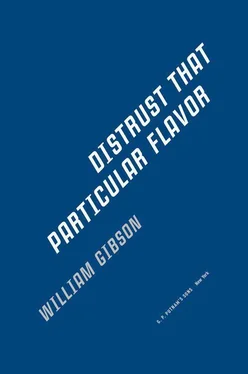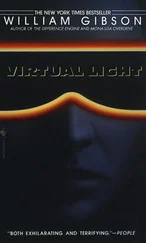WILLIAM GIBSON
DISTRUST THAT PARTICULAR FLAVOR

INTRODUCTION: AFRICAN THUMB PIANO
When I started to try to learn to write fiction, I knew that I had no idea how to write fiction. This was actually a plus, that I knew I didn’t know, but at the time it was scary. I was afraid that people who were somehow destined to write fiction came to the task already knowing how. I clearly didn’t, so likely I wasn’t so destined. I sat at the typewriter, the one on which I’d written undergraduate essays, trying to figure out how to try.
Eventually I began to try to write a sentence. I tried to write it for months. It grew longer. Eventually it became: “Seated each afternoon in the darkened screening room, Graham came gradually to see the targeted numerals of the academy leader as hypnagogic sigils preceding the dreamstate of film.” I’m not sure it was Graham. Maybe it was Bannister. It was a sentence far too obviously in the manner of J. G. Ballard, and Ballard gave his protagonists sturdy, everyman British middle-class surnames.
I had no idea what my sentence meant, in terms of where any narrative might go, but I now know that that was not a bad thing. I was in the first place of fiction, as was my protagonist. A door was opening, however slightly. I began to imagine that the deserted (recently deserted?) office building in which Graham/Bannister reviewed film had a fountain in its atrium, and in this fountain, submerged, along with the usual coins, were dozens of wristwatches, some of them very expensive. Time had ended, perhaps, or the awareness of its passage had become somehow undesirable. And that was as far as I went, the door closing. I may have sensed, correctly, that a Ballard pastiche, no matter how earnest, was somehow not the thing.
Later attempts sometimes involved outer space, though outer space more in the manner, I hoped, of Alfred Bester or Samuel R. Delany. I don’t remember them. My wife parodied them all, not unkindly, as “His long green ears quivering, Fimo slipped from the rig.” Today this reminds me that I was having trouble with character names. At one point I seriously considered borrowing them from products in the IKEA catalog. But there was always something akin to “the rig.” Some unimagined (by me), hence unnamed, element of technology. But already I sensed that even if I had somehow come to know what the rig was, what it was for, it was better not to tell the reader just then. “Javnaker slipped from the quantum universe-splitter that wasn’t actually a time machine” would not be good for the reader.
And therein, I think, lies most of how one learns to write fiction. We have to learn to write fiction, but we have already, to varying degrees, had to learn to read it. And I felt like quite a good reader of fiction, when I began to write fiction, or at least a good reader of that fiction which I most keenly enjoyed. And thus are we shaped as writers, I believe, not so much by who our favorite writers are as by our general experience of fiction. Learning to write fiction, we learn to listen for our own acquired sense of what feels right, based on the totality of the pleasure (or its lack) that fiction has provided us. Not direct emulation, but rather a matter of a personal micro-culture.
Knowing how seriously aspiring writers of fiction can take advice from more established writers of fiction, I’m generally reluctant to say more than: If you wish to learn to write fiction, it helps if you’ve read a lot of it before you begin to try. And that in any case, you’ll likely need to spend a lot of time discovering how to try, and then a lot more time trying. I don’t really remember anything very specific about learning to drive, other than a neat trick for parallel parking, and learning to write fiction is a lot like that (except for no terrified instructor in the passenger seat, though in a way we each provide one of those as well).
Eventually, I was able to write something like a story, and it was published, however obscurely. Later, after what seemed like dozens of false starts, I wrote several more. I began to meet other people who were attempting to write science fiction, and noticed that most of them had found ways to write, and to be read, that didn’t involve payment. Science fiction had long been surrounded by a generations-deep compost of fanzines, a sort of paper Internet, and this could be extremely engrossing, and apparently gratifying. But after trying that avenue of publication a few times, I decided to avoid it.
My decision, such as it was, ran something like this: I am in the process of discovering that place from which my fiction comes, and the process may best be served by limiting the act of writing to the writing of fiction which I might reasonably expect to sell. (I don’t offer this by way of advice, though, because some writers clearly thrive on exactly the opposite path.)
The distinction I was making wasn’t between paid versus unpaid, exactly. It wasn’t about whatever sum might be involved. It was about a certain demonstration of agency. It involved a harsher dichotomy. Every word written (or written then subtracted, which is often more important) contributed to the possibility, or not, of an event happening in the world outside oneself. Either someone whose rent was paid by their job of selecting stories, someone for whom it actually mattered, could be induced by my words on a page to buy my story, or they couldn’t. This seemed like magic to me, and still does. As if the right runes, scratched in the dirt, could produce a bag of groceries. Once you’ve managed to do this successfully, doing it again isn’t quite so much about the groceries as about the peculiar wonder of it.
The door into fiction-writing space began to open more easily, and more regularly. A huge amount of the thing is simply practice, but that practice, for me, had to be practice in the actual writing of fiction. The itch to become a writer could be scratched, I suspected, too easily, with other kinds of writing. Self-discipline never having been my strong suit, I became uncharacteristically strict with myself about writing only fiction.
Which is why I have never felt entirely comfortable with the pieces collected here.
They are violations of that early prime directive. They aren’t fiction. Worse, they somehow aren’t quite nonfiction either, it feels to me, because they were written from the fiction-writing place, the only writing place I had, with fiction-writing tools, the only writing tools I had. I didn’t feel adequately professional, writing nonfiction. I felt as though I was being paid to solo on some instrument vaguely related to one I actually knew how to play.
I had had no formal training in journalism. The idea of keeping a diary or journal had always made me uncomfortable. The idea of direct, unfiltered autobiography made me even more uncomfortable. By the time I began to occasionally be asked to write nonfiction, the membrane surrounding the fiction-writing place had been sanded to a workable thinness, was porous. The world washed in, if I was lucky, and was transformed. On a good working day, I watched as some largely unconscious process turned reality, or what passed for it, into fantasy. Which was what I had wanted, how I had wanted to make my living. To write nonfiction felt worryingly counter to that.
And yet. Opportunities to visit new places, to meet interesting people. A certain permission to ask questions. These things can prove extraordinarily valuable to a writer of fiction. The peculiarity quotient of the stuff washing in through the membrane rises. One is in Tokyo, one is in Singapore, one is in the Zona Rosa or in an after-hours club in Dublin. And someone else is paying for it. Is paying for you to be exactly there, doing approximately that, and the fiction-writing place, though you don’t notice it at the time, benefits.
Читать дальше











